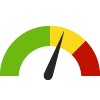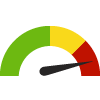Indicator Gauge Icon Legend
Legend Colors
Red is bad, green is good, blue is not statistically different/neutral.
Compared to Distribution
 the value is in the best half of communities.
the value is in the best half of communities.
 the value is in the 2nd worst quarter of communities.
the value is in the 2nd worst quarter of communities.
 the value is in the worst quarter of communities.
the value is in the worst quarter of communities.
Compared to Target
 meets target;
meets target;  does not meet target.
does not meet target.
Compared to a Single Value
 lower than the comparison value;
lower than the comparison value;
 higher than the comparison value;
higher than the comparison value;
 not statistically different from comparison value.
not statistically different from comparison value.
Trend

 non-significant change over time;
non-significant change over time; 
 significant change over time;
significant change over time;  no change over time.
no change over time.
Compared to Prior Value
 higher than the previous measurement period;
higher than the previous measurement period;
 lower than the previous measurement period;
lower than the previous measurement period;
 no statistically different change from previous measurement period.
no statistically different change from previous measurement period.
 Significantly different than the overall value
Significantly different than the overall value
 No significant difference with the overall value
No significant difference with the overall value
 No data on significance available
No data on significance available
Adults Who Access Medical Services and Information through the Internet
This indicator is archived and is no longer being updated. Click to learn more
Why is this important?
- Web sites geared to consumer health issues, promotion of various healthy lifestyles, and interventions to prevent the onset of disease.
- Used to facilitate electronic communications between patients and care providers, typically in the form of electronic mail (e-mail).
- Emerging as a medium for giving consumers direct access to their personal health records including dates and times of consultations, diagnoses, laboratory results, prescriptions, and more.
- Overcoming the unequal distribution of clinical expertise through remote medical consultation.
Census Tract: 06111007505
Measurement period: 2023
Maintained by: Conduent Healthy Communities Institute
Last update: March 2024
Graph Selections
| Census Tract | Source | Measurement Period | Percent | |
|---|---|---|---|---|
Data Source
- Claritas Consumer Profiles
Maintained By: Conduent Healthy Communities Institute (Methodology)
Filed under: Health / Health Information Technology, Health / Health Care Access & Quality, Community / Social Environment, Social Determinants of Health, Adults



